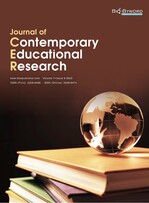Abstract
As assessment outcomes provide students with a sense of accomplishment that is boosted by the reward system, learning becomes more effective. This research aims to determine the effects of reward system prior to assessment in Mathematics. Quasi-experimental research design was used to examine whether there was a significant difference between the use of reward system and students’ level of performance in Mathematics. Through purposive sampling, the respondents of the study involve 80 Grade 9 students belonging to two sections from Gaudencio B. Lontok Memorial Integrated School. Based on similar demographics and pre-test results, control and study group were involved as participants of the study. Data were treated and analyzed accordingly using statistical treatments such as mean and t-test for independent variables. There was a significant finding revealing the advantage of using the reward system compare to the non-reward system in increasing students’ level of performance in Mathematics. It is concluded that the use of reward system is effective in improving the assessment outcomes in Mathematics. It is recommended to use reward system for persistent assessment outcomes prior to assessment, to be a reflection of the intended outcomes in Mathematics. Data were treated and analyzed accordingly using statistical treatments herewith, mean and t-test for independent variables. It was concluded that there was a significant finding revealed that the advantage of using the reward system compare to the non-reward system in increasing students’ level of performance in Mathematics. The researcher concluded that the used of reward system is effective in improved the assessment outcomes in Mathematics. It is recommended to use reward system for persistent assessment outcomes prior to assessment to be a reflection of the intended outcomes in Mathematics.
References
Tomlinson CA, 2020, Fulfilling the Promise of the Differentiated Classroom: Strategies and Tools for Responsive Teaching, Alexandria, VA: ASCD.
Baranek LK, 1996, The Effect of Rewards and Motivation on Student Achievement, thesis, Grand Valley State University ProQuest Dissertations Publishing, 285.
Akin-Little KA, Eckert TL, Lovett BJ, et al., 2004, Extrinsic Reinforcement in the Classroom: Bribery or Best Practice. School Psychology Review, 33(3): 344–362.
Wang L, 2021, A Longitudinal Study on Activation to Behaviors of Reward. Proceedings of the 2021 International Conference on Public Relations and Social Sciences, 2021 (ICPRSS 2021), 732–736. https://doi.org/10.2991/assehr.k.211020.248
Gustafson RF, 2020, The Physical, Social & Emotional Characteristics of High School Students, How To Adult, viewed April, 2023.
Rizkinta E, Surya E, 2017, Effect of Granting Reward on Learning Outcomes of Mathematics in Class IV of Public Primary School 014680 of Buntu Pane. International Journal of Sciences: Basic and Applied Research, 34(1): 101–110.
